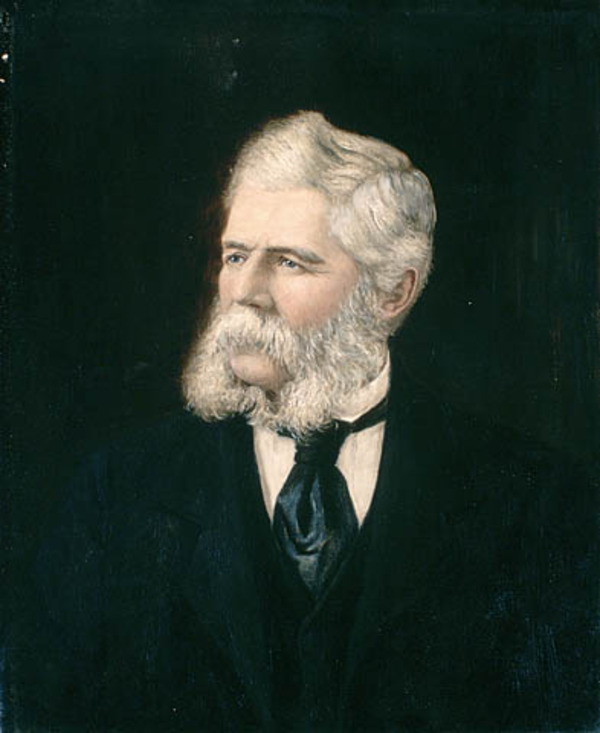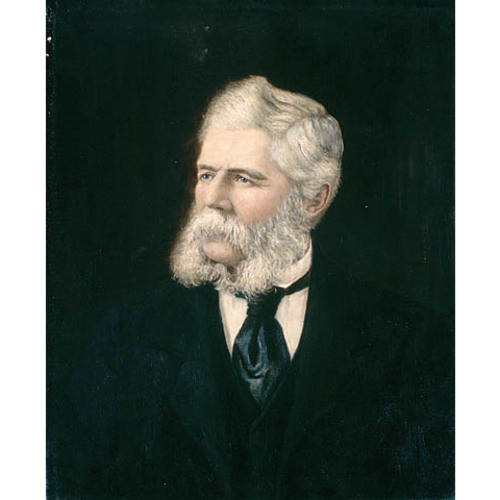WILLIAMS, JAMES MILLER, carriage maker, manufacturer, entrepreneur, and politician; b. 14 Sept. 1818 at Camden, N.J.; m. in 1842 M. C. Jackson of London, Canada West, and they had three sons and a daughter; d. 25 Nov. 1890 in Hamilton, Ont.
James Miller Williams apprenticed as a carriage maker in his birthplace before immigrating with his family to London, Upper Canada, in 1840. There he plied his trade, and within two years entered into partnership with Marcus Holmes to manufacture carriages. He soon bought out his partner and ran the business alone until he moved to Hamilton. By 1851 he was operating the Hamilton Coach and Carriage Factory which employed 70 men and produced ten vehicles per week, many of them for public transit. The increasing number of fare-paying passengers on both urban and interurban lines was shifting the carriage industry away from concentration on vehicles for individual use. Williams also contracted to manufacture cars for the Great Western Railway. Some time before 1857 he and his partner, H. G. Cooper, established the firm of Williams and Cooper, carriage manufacturers. Cooper bought him out in 1859.
In the 1850s Williams became interested in petroleum. Few at the time knew much about petroleum, although James Young in Scotland and Abraham Gesner* in Nova Scotia sparked some interest in it. Questions of supply and demand and of uses, as well as technical problems of recovery, refining, and transportation, were still unanswered, and it was not certain whether petroleum could become the foundation for a viable industry. For many years the existence of petroleum in southwestern Ontario had been known, and the Geological Survey of Canada had drawn attention to the deposits, but commercial possibilities had not been explored. However, about 1850 two brothers from Woodstock, Henry and Charles Nelson Tripp, became interested in the possibilities of producing asphalt from the “gum beds” of Enniskillen Township in Lambton County. They acquired land on Black Creek, began producing asphalt, and in 1854 incorporated the International Mining and Manufacturing Company. The following year their asphalt received an honourable mention at the universal exhibition in Paris. However, the Tripps were unsuccessful financially and the company passed to Williams. By 1857 J. M. Williams and Company was refining petroleum, albeit crudely, at Oil Springs, Lambton County, and by 1860 Williams had set up a refinery in Hamilton; the next year he and his associates, working as the Canadian Oil Company, had reportedly invested over $42,000 in the venture.
Much fruitless debate has taken place over whether Williams was the first man in North America to drill successfully for oil. A claim has been made for Edwin Laurentine Drake of Pennsylvania. Williams was working finds before Drake, but because he left no record of his work, and his early ventures were of little interest to contemporary journalists, there is no way of knowing whether his early wells were drilled or dug and cribbed. The significant fact is that he was the first entrepreneur with sufficient capital, business acumen, technical understanding, and tenacity to tackle the petroleum of Lambton County. Spurred by the sudden growth in the use of petroleum-based lubricants and illuminants, he succeeded in his enterprise, thereby demonstrating the viability of an Ontario petroleum industry.
Like many of his contemporaries, Williams was an entrepreneur of diverse interests. His investment in oil through such companies as J. M. Williams and Company and the Canadian Oil Company was only part of his career. He gradually passed control of the oil interests to his son, Charles Joseph Williams, and in 1879 sold the Canadian Oil Company to him. His success in oil led him into the financial and investment field. He was actively involved in the Hamilton Provident and Loan Society, the Mutual Life Association of Canada, the Victoria Mutual Fire Insurance Company of Canada, the Bank of Hamilton (founded in 1872), the Hamilton and Lake Erie Railway, the Hamilton and North Western Railway, and the Wellington, Grey and Bruce Railway. By 1871 Williams had established J. M. Williams and Company, manufacturers of wholesale tin ware, a firm he sold to his son in 1876.
Financially successful and secure, Williams turned to politics. First elected an alderman in Hamilton, he was returned to the Ontario legislature as the Liberal member for Hamilton in 1867, 1871, and 1875. Upon his retirement from politics in 1879, he was appointed registrar of Wentworth County, a position he held until his death in November 1890.
Baker Library, R. G. Dun & Co. credit ledger, Canada, 25: 107, 147, 166, 208, 213, 287. Robert Bell, “The petroleum field of Ontario,” RSC Trans., 1st ser., 5 (1887), sect. IV: 101–13. Hamilton and its industries: being a historical and descriptive sketch of the city of Hamilton and its public and private institutions, manufacturing and industrial interests, public citizens, etc., comp. E. P. Morgan and F. L. Harvey (Hamilton, Ont., 1884; 2nd ed., 1884). T. S. Hunt, “Notes on the history of petroleum or rock oil,” Canadian Naturalist and Geologist, 6 (1861): 241–55. Charles Robb, “On the petroleum springs of western Canada,” Canadian Journal, new ser., 6 (1861): 313–23. [J. F. Tyrrell], The oil districts of Canada; compiled from official and other reliable sources (New York, 1865). Hamilton Spectator, 30 Aug. 1851. Times (Hamilton), 26 Nov. 1890. Canada directory, 1851; 1857–58. Fergus Cronin, “North America’s father of oil,” Imperial Oil Rev. (Toronto), 39 (1955), no.2: 16–20; repub. in Imperial Oil Rev., 42 (1958), no.3: 22–25. “The driller that history forgot: unsung and unpraised, Dr. H. C. Tweedel drilled New Brunswick’s first oil well and beat ‘Col.’ Drake as the first American oil driller,” Imperial Oil Rev., 39 (1955), no.1: 21.
Cite This Article
Norman R. Ball and Edward Phelps, “WILLIAMS, JAMES MILLER,” in Dictionary of Canadian Biography, vol. 11, University of Toronto/Université Laval, 2003–, accessed December 17, 2024, https://www.biographi.ca/en/bio/williams_james_miller_11E.html.
The citation above shows the format for footnotes and endnotes according to the Chicago manual of style (16th edition). Information to be used in other citation formats:
| Permalink: | https://www.biographi.ca/en/bio/williams_james_miller_11E.html |
| Author of Article: | Norman R. Ball and Edward Phelps |
| Title of Article: | WILLIAMS, JAMES MILLER |
| Publication Name: | Dictionary of Canadian Biography, vol. 11 |
| Publisher: | University of Toronto/Université Laval |
| Year of publication: | 1982 |
| Year of revision: | 1982 |
| Access Date: | December 17, 2024 |




